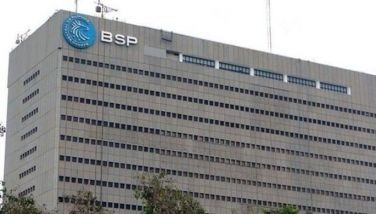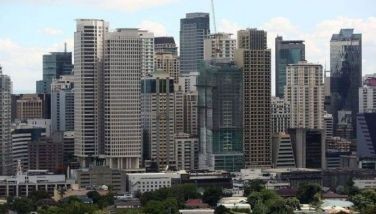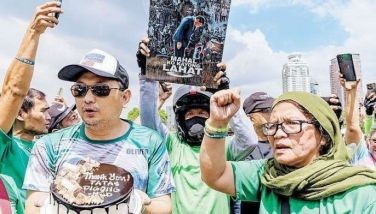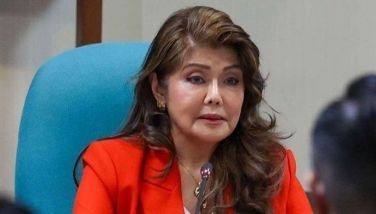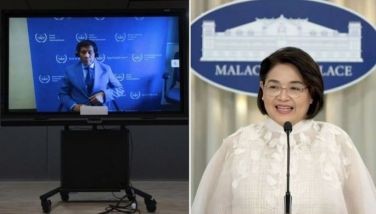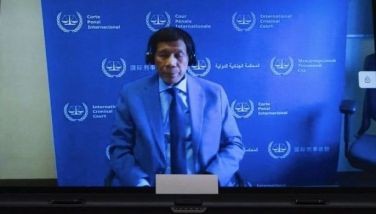On presidential travels, the private sector and agri-microentrepreneurs

I had a very interesting interview with Karen Davila on her show in ANC. I think this puts into perspective some of the issues about where our economy is headed and what the private sector can do to help our economy moving forward.
Here are some excerpts:
Karen Davila: What do you say to people who say the President is travelling too much?
Joey Concepcion: We in the private sector, we are CEOs, our companies are public, and so is the Philippines, in a sense. Everybody’s competing for all these investors. It’s very important that the President gets to be known out there. He’s the no. one salesman of the Philippines. Hearing the story, his vision for the country, is very important. No. two, you cannot build relationships through a phone call. Relationships are built by being visible at these events that are happening now. After this, I think the President will go to Davos, and that’s another significant event where the top businessmen go once a year. I think you can see the President’s great intention is to sell the Philippines, and under his leadership, [for them to see] what can they expect if they invest in this country.
Q: What do we gain from going to Davos?
That’s where all the top businessmen of the world go. You get invited if you are one of them. My own experience attending it, the biggest companies and entrepreneurs are all in Davos. I think it’s worth the trip. It’s very important that the President continues to attend these very high-profile events where the most successful businessmen attend. I think once they hear the President’s speech, I am sure they will be more optimistic in investing in the Philippines.
Q: How does the President balance the fact that he needs to travel and there are so many issues that need to be addressed back home?
Definitely, the problems will always be there – from the pandemic, now rising interest rates and prices. That was way before he became President and I share that risk confronting us. But there’s a limit to what we can do about the inflation because it’s not caused by us, but by the conflict in Ukraine and Russia, which created a great supply chain disruption. And of course, the US is trying to stem inflation by raising interest rates, and if we don’t follow suit, the peso is going to lose its value. These are uncontrollable factors. The US is leading the way and we’re just following suit. We can’t do anything about the war and we have to live with it.
The private sector is doing what it can; it is the engine of growth. We are able to cope. If you look at the fourth quarter, I think it’s going to be a surprise for many. I think we are going to surpass expectations. Many businesses in this last quarter are doing quite well. Yes, the margins will be affected, but for as long as the sales volume is there, it’s going to be fine.
Q: The ADB noted that the Philippines ranks with India and Vietnam as a trade growth leader through to 2026. What do you believe should this administration focus on in terms of foreign direct investments?
I think the Philippines will have to make it clear what the vision is. What kind of manufacturing we want to bring to the country. Aside from BPOs and all of that, we really have to build on manufacturing, and that is something we hope to attain. That’s why it’s important for the President to continue these trips overseas, to be able to attract people that the Ease of Doing Business (EODB) in the country is, in fact, a reality.
Q: You have been through so many administrations. EODB has always been a goal. Have there been improvement over the years?
The idea of forming the Private Sector Advisory Council (PSAC) is taken seriously. I head the jobs cluster and these are owners of large companies – like Tessie, Lance and Kevin – and all these guys who are in my committee, and there are six of these focused on each critical sector. This administration is taking this seriously. The President puts in a lot of time, we meet at least once every quarter, he is right on schedule, nobody is late, the meetings last maybe two to three hours, and it’s well prepared. We are putting in a lot of time. Despite their busy schedules, the leaders of these conglomerates contribute their time and effort to really help the President and that, to me, is a big, big difference.
Q: Just recently the President met with the PSAC, led by Sabin Aboitiz, and you were all there. You are advocating the importance of helping agri microentrepreneurs. How can we make a dent in agricultural growth?
It was a meeting with the President and the other council members on jobs. Our MSMEs contribute 62 percent to job generation, so if we scale them up, then we will be able to create more jobs. But the biggest challenge is not in the retail sector, it’s in the agriculture sector. Our micro farmers are the ones who have to move up the chain, so how do we do that?
In that meeting, Christian Moeller of Lionheart Farms, which is based in Palawan, had a successful model that he presented to the President. It is a big-brother approach whereby the big brother approaches the farmers and provides for them. He leases the land from them and pays them based on their productivity. These models are what we are going to integrate. That’s why [DILG] Sec. Abalos was there in the meeting because the LGUs are a very important partner in helping the private sector get to the farmers directly, especially the mayors.
In the case of Mayor Eddie Guillen of Ilocos Norte, he has done a great job in Piddig. And that’s the model we want to follow – working with the LGU leadership and the private sector.
Q: Do you have a target in terms of the number of the farms?
What we intend to do, there are successful models like Lionheart, Winston Uy in Ilocos, Henry Lim Bon Liong in rice. There are big brothers we are identifying right now and they can share their best practices with one another, and the LGUs, we will expose them to these big brothers who have platforms that are already working. So if they want that agribusiness model to move in their area, then that’s where the collaboration can come.
Q: About the sovereign wealth fund (SWF), you’ve seen all the criticisms and concerns, and even the amendments the lawmakers are doing just to pass the fund. Is it time to have a SWF considering it is a small amount at this point?
I met a former head of the World Bank a couple of days back and his advice is, yes, it’s worth it for the Philippines and it is ready. If you look at SWFs, there are about a hundred of them, but we focus on investing in the Philippines. Just look at the past: How much was Semirara sold for? How much was NGCP sold for? How much was Fort Bonifacio sold for? Back then the price per square meter in BGC was P25,000 per square, now it’s P2 million. What I’m trying to say is that, provided the SWF will be participated in by the private sector in the board, at least as an advisory capacity, and the projects that the SWF that will invest in will be coming from basically most of the winners these large conglomerates companies who have a great track record. What is wrong to invest in these potential infrastructure investments which the country needs anyway?
Q: But why a SWF instead of public private partnership (PPP) considering the target is to invest within the country? Most SWFs invest outside. Why can’t we just do more PPPs instead of this fund?
It continues. The PPPs, normally when they bid out, for example, like Manila Bay, there are only three or four proponents to that right now, to that they are all 100 percent owned by that. But if you had a fund, then we could invest in projects like the Manila Bay reclamation.
When we talk about investing in the country first, focusing first here, that doesn’t mean that we limit it to that. Down the road, as the fund performs and there is greater confidence from the public in the fund, then we can invest abroad like all other SWFs and make investments overseas. But I am glad that they scaled the amount down to about a hundred plus billion pesos – that’s a good step – and that there is greater clarity in the structure of the board and the advisory. I think it’s baby steps, from P250 billion down to P120 billion, focus on the Philippines first, we do well and then start to expand overseas.
Q: What is your take on Prof. Emeritus Solita Monsod saying that this is just a fantastic milking cow?
I don’t quite agree with that statement. We should give this administration a chance to prove that they are quite serious about bringing back our economy. I talked to Romy Bernardo, he is not for or against it, but he is open. I think it’s a question of trust. As I was saying, the board composition, who are the experts who are going to sit in that board, is going to be very important, especially those with a good track record in investing. And again, investing in our own country with these infrastructure projects that are coming out, will definitely yield good returns for the fund. And as they succeed, then they can move to invest in other countries. Of course, handled by different investment managers.
- Latest
- Trending





















